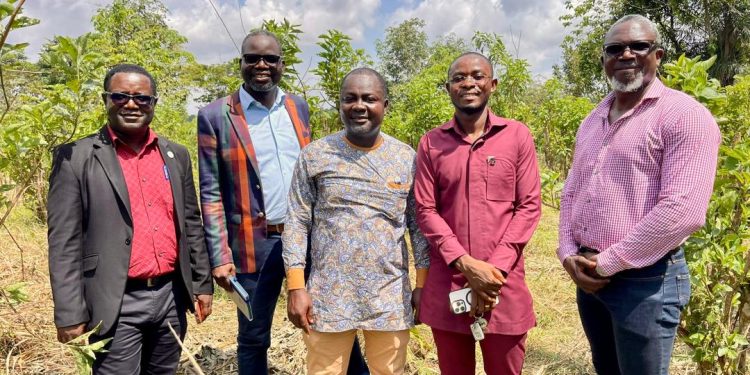Malawian Delegation Hails HEPA Plus Boss for Pioneering Medicinal Plant Farm

A visiting delegation of herbal medicine experts from Malawi has applauded Dr. Ebenezer Agyemang, founder of HEPA Plus, for pioneering one of Ghana’s most outstanding medicinal plant farms—an initiative they say is setting a new standard for herbal medicine production across the continent.
The delegation, drawn from the Kamu zu University of Health Sciences (KUHeS) in Blantyre, described the 20-acre organic farm as a “bold and visionary investment” that confronts one of Africa’s biggest obstacles in herbal medicine: contaminated raw materials.
zu University of Health Sciences (KUHeS) in Blantyre, described the 20-acre organic farm as a “bold and visionary investment” that confronts one of Africa’s biggest obstacles in herbal medicine: contaminated raw materials.
During a tour of the farm and production facilities of Ebenage Herbal Productions and Consult, producers of HEPA Plus, Plasmox and Pavi, the group’s leader, Dr. John Mponda, a pharmacist and a lecturer at Kamuzu University, commended Dr. Agyemang for taking control of his raw material supply chain at a time when illegal mining, chemical farming, and environmental pollution threaten the purity of medicinal plants in many regions.

“What we have seen here is remarkable. This is how herbal medicine producers should operate—starting from the soil,” Dr. Mponda said. “Dr. Agyemang is ahead of the curve. His farm demonstrates the discipline, scientific approach, and commitment needed to produce safe herbal medicines.”
Dr. Agyemang established the farm in 2020 to ensure that HEPA Plus, Plasmox, and Pavi—three of the company’s flagship products—are made from clean, uncontaminated plants grown under strict good agricultural practices (GAP). He noted that inorganic fertilizers, pesticides, and polluted soils significantly compromise the safety of herbal products.

“Medicinal plants must be grown with precision. You cannot rely on chemicals and expect a safe final product,” he explained. “That is why we use manual weeding, organic composting, and strict monitoring. It costs more, but it protects consumers.”
The Malawian delegation is in Ghana to study how the country manages herbal medicine training, regulation, and product development. Ghana’s herbal system, led by institutions such as KNUST and the Centre for Plant Medicine Research, is widely considered one of the most advanced in Africa.
Head of the Department of Herbal Medicine at KNUST, Dr. Kofi Turkson, who accompanied the visitors, described Dr. Agyemang’s initiative as a timely intervention amid widespread pollution caused by galamsey.
“With forests destroyed and water bodies contaminated, sourcing clean medicinal plants from the wild has become dangerous,” Dr. Turkson said. “Dr. Agyemang’s farm provides certainty—clean, traceable raw materials that can meet both local and international standards.”
He warned that harvesting herbs from roadsides, polluted soils, or contaminated water bodies exposes consumers to toxins, even when the plants themselves are not harmful.
The Malawian delegation said their visit to Ghana has reinforced the need for African countries to invest in controlled medicinal plant cultivation and to strengthen partnerships with institutions and innovators who are leading the way.
They pledged to deepen collaboration with KNUST and Ebenage Herbal Production as Malawi works toward developing its own policy and regulatory framework for traditional medicine.






